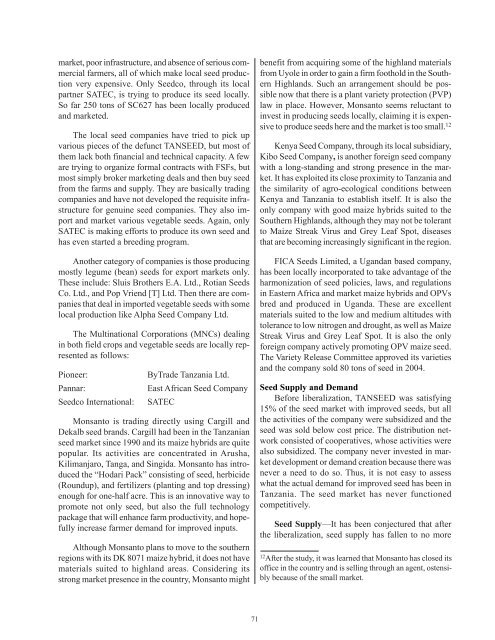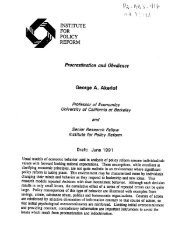An Action Plan for Developing Agricultural Input Markets in Tanzania
An Action Plan for Developing Agricultural Input Markets in Tanzania
An Action Plan for Developing Agricultural Input Markets in Tanzania
Create successful ePaper yourself
Turn your PDF publications into a flip-book with our unique Google optimized e-Paper software.
market, poor <strong>in</strong>frastructure, and absence of serious commercial<br />
farmers, all of which make local seed production<br />
very expensive. Only Seedco, through its local<br />
partner SATEC, is try<strong>in</strong>g to produce its seed locally.<br />
So far 250 tons of SC627 has been locally produced<br />
and marketed.<br />
The local seed companies have tried to pick up<br />
various pieces of the defunct TANSEED, but most of<br />
them lack both f<strong>in</strong>ancial and technical capacity. A few<br />
are try<strong>in</strong>g to organize <strong>for</strong>mal contracts with FSFs, but<br />
most simply broker market<strong>in</strong>g deals and then buy seed<br />
from the farms and supply. They are basically trad<strong>in</strong>g<br />
companies and have not developed the requisite <strong>in</strong>frastructure<br />
<strong>for</strong> genu<strong>in</strong>e seed companies. They also import<br />
and market various vegetable seeds. Aga<strong>in</strong>, only<br />
SATEC is mak<strong>in</strong>g ef<strong>for</strong>ts to produce its own seed and<br />
has even started a breed<strong>in</strong>g program.<br />
<strong>An</strong>other category of companies is those produc<strong>in</strong>g<br />
mostly legume (bean) seeds <strong>for</strong> export markets only.<br />
These <strong>in</strong>clude: Sluis Brothers E.A. Ltd., Rotian Seeds<br />
Co. Ltd., and Pop Vriend [T] Ltd. Then there are companies<br />
that deal <strong>in</strong> imported vegetable seeds with some<br />
local production like Alpha Seed Company Ltd.<br />
The Mult<strong>in</strong>ational Corporations (MNCs) deal<strong>in</strong>g<br />
<strong>in</strong> both field crops and vegetable seeds are locally represented<br />
as follows:<br />
Pioneer: ByTrade <strong>Tanzania</strong> Ltd.<br />
Pannar: East African Seed Company<br />
Seedco International: SATEC<br />
Monsanto is trad<strong>in</strong>g directly us<strong>in</strong>g Cargill and<br />
Dekalb seed brands. Cargill had been <strong>in</strong> the <strong>Tanzania</strong>n<br />
seed market s<strong>in</strong>ce 1990 and its maize hybrids are quite<br />
popular. Its activities are concentrated <strong>in</strong> Arusha,<br />
Kilimanjaro, Tanga, and S<strong>in</strong>gida. Monsanto has <strong>in</strong>troduced<br />
the “Hodari Pack” consist<strong>in</strong>g of seed, herbicide<br />
(Roundup), and fertilizers (plant<strong>in</strong>g and top dress<strong>in</strong>g)<br />
enough <strong>for</strong> one-half acre. This is an <strong>in</strong>novative way to<br />
promote not only seed, but also the full technology<br />
package that will enhance farm productivity, and hopefully<br />
<strong>in</strong>crease farmer demand <strong>for</strong> improved <strong>in</strong>puts.<br />
Although Monsanto plans to move to the southern<br />
regions with its DK 8071 maize hybrid, it does not have<br />
materials suited to highland areas. Consider<strong>in</strong>g its<br />
strong market presence <strong>in</strong> the country, Monsanto might<br />
71<br />
benefit from acquir<strong>in</strong>g some of the highland materials<br />
from Uyole <strong>in</strong> order to ga<strong>in</strong> a firm foothold <strong>in</strong> the Southern<br />
Highlands. Such an arrangement should be possible<br />
now that there is a plant variety protection (PVP)<br />
law <strong>in</strong> place. However, Monsanto seems reluctant to<br />
<strong>in</strong>vest <strong>in</strong> produc<strong>in</strong>g seeds locally, claim<strong>in</strong>g it is expensive<br />
to produce seeds here and the market is too small. 12<br />
Kenya Seed Company, through its local subsidiary,<br />
Kibo Seed Company, is another <strong>for</strong>eign seed company<br />
with a long-stand<strong>in</strong>g and strong presence <strong>in</strong> the market.<br />
It has exploited its close proximity to <strong>Tanzania</strong> and<br />
the similarity of agro-ecological conditions between<br />
Kenya and <strong>Tanzania</strong> to establish itself. It is also the<br />
only company with good maize hybrids suited to the<br />
Southern Highlands, although they may not be tolerant<br />
to Maize Streak Virus and Grey Leaf Spot, diseases<br />
that are becom<strong>in</strong>g <strong>in</strong>creas<strong>in</strong>gly significant <strong>in</strong> the region.<br />
FICA Seeds Limited, a Ugandan based company,<br />
has been locally <strong>in</strong>corporated to take advantage of the<br />
harmonization of seed policies, laws, and regulations<br />
<strong>in</strong> Eastern Africa and market maize hybrids and OPVs<br />
bred and produced <strong>in</strong> Uganda. These are excellent<br />
materials suited to the low and medium altitudes with<br />
tolerance to low nitrogen and drought, as well as Maize<br />
Streak Virus and Grey Leaf Spot. It is also the only<br />
<strong>for</strong>eign company actively promot<strong>in</strong>g OPV maize seed.<br />
The Variety Release Committee approved its varieties<br />
and the company sold 80 tons of seed <strong>in</strong> 2004.<br />
Seed Supply and Demand<br />
Be<strong>for</strong>e liberalization, TANSEED was satisfy<strong>in</strong>g<br />
15% of the seed market with improved seeds, but all<br />
the activities of the company were subsidized and the<br />
seed was sold below cost price. The distribution network<br />
consisted of cooperatives, whose activities were<br />
also subsidized. The company never <strong>in</strong>vested <strong>in</strong> market<br />
development or demand creation because there was<br />
never a need to do so. Thus, it is not easy to assess<br />
what the actual demand <strong>for</strong> improved seed has been <strong>in</strong><br />
<strong>Tanzania</strong>. The seed market has never functioned<br />
competitively.<br />
Seed Supply—It has been conjectured that after<br />
the liberalization, seed supply has fallen to no more<br />
12 After the study, it was learned that Monsanto has closed its<br />
office <strong>in</strong> the country and is sell<strong>in</strong>g through an agent, ostensibly<br />
because of the small market.

















